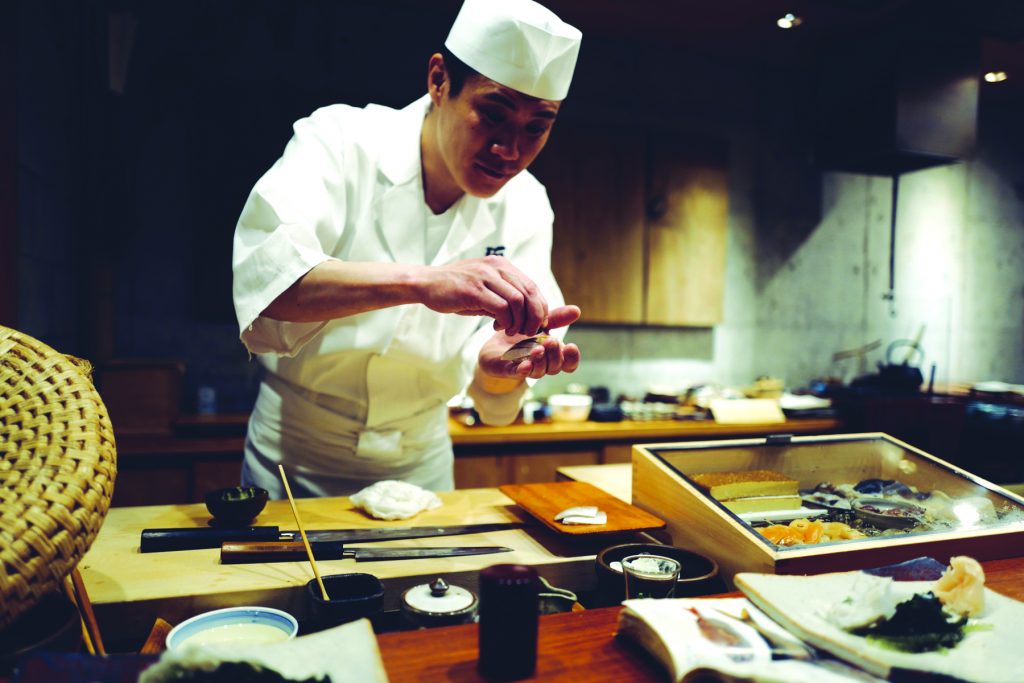Impeccable service and exclusive experiences define luxury in the new Japan, writes Kristie Kellahan.
No discussion of luxury in Japan would be complete without mention of the incredible culinary scene. It sometimes seems that to live is to eat in a nation where fabulous food is everywhere, from traditional family-run ryokan inns to brightly coloured department store basement food halls. It is a culture experienced as much through the taste of fresh squid at the fish markets as it is the sight of pink cherry blossoms bursting into spring loveliness.
After award-winning documentary Jiro Dreams of Sushi turned seasoned chef Jiro Ono into an international superstar, his restaurant in Tokyo was booked out months in advance. Diners were willing to wait that long for a 20-course meal — Jiro chooses the dishes — costing almost 500 dollars and lasting not much more than 15 minutes.

For many widely travelled foodies, it was money well spent. In addition to delicious morsels of fatty tuna and perfectly cooked rice, the thing diners were willing to hand over money for was an exclusive, unforgettable experience of extraordinary care and craftsmanship. Such memorable experiences have a ‘brag factor’ not always correlated to such a high price tag.
Japanese columnist, TV host and author of books on luxury travel, Mr Takanori Nakamura is also the chairman of the World’s 50 Best Restaurants. He says gastronomy is the clincher for attracting luxury tourism business, and he says that Japan does it better than many other destinations. Top of his list of restaurants worth travelling to Japan for are Den, Ryugin, Quintessence and Florilege Tokyo.
“There is a big movement of people choosing an international destination because of one or two restaurants they want to visit, and then building the rest of the itinerary from there,” he says. “Look at the popularity of NOMA Tokyo: over 40 days, 2,000 seats at the table were available, for which there were 62,000 requests from diners willing to pay 70,000 yen [more than A$800] per person. Amazing, luxurious ‘show off’ foodie experiences drive tourism here to Japan as to other parts of the world.”
Earlier this year I attended ILTM Japan, the leading luxury travel showcase for an unrivalled collection of high-end Japanese travel experiences. In speaking with tour operators, hoteliers, restaurateurs and experience curators, pictures emerged of a country where the manner of doing things is as important as the experience itself.
With record numbers of travellers heading to Japan, and even more expected as Tokyo 2020 Summer Olympics approaches, many new luxury hotels are opening, including the Four Seasons and the Ritz-Carlton in Kyoto. There’s a push to make foreign visitors travel more easily, with ‘foreigner-friendly’ taxi stands springing up and more English-language proficiency training for service professionals.
There is a huge opportunity for savvy local operators in Japan to showcase truly unique cultural experiences. Guests of Luxurique, a hospitality management company in Japan specialising in high-end hospitality for the MICE market, can benefit from the founder’s impeccable connections to experience such only-in-Japan moments as a private swordsmanship class with a samurai warrior or a masterclass on Ikebana, the Japanese art of flower arrangement. Family travellers are also well catered for, with bespoke itineraries created for the littlest samurai right through to multi-generational adventures.
It’s true that luxury in Japan has a different face than in other, showier parts of the world. You’ll have to look a bit harder to find 24-carat gold-dusted cappuccinos or super-bling penthouse suites. VIPs checking in at a hotel’s front desk will be greeted by a line of impeccably courteous staff, not a fireworks display. What is considered luxurious in the land of the rising sun tends to be more about exceptional, intuitive service than ostentatious consumption.
On a recent stay at Hotel Chinzanso Tokyo, a beautiful, sprawling property with a top-notch spa, I joined Andre Sol, Director of Guest Services, for breakfast. As we chatted, I mentioned that my business cards had been lost in transit. As I would be attending ILTM Japan the next day, I asked Andre where I could find a printer that might be persuaded to make some up overnight. Business cards are an essential part of interacting on a professional basis in Japan and it would not have been the done thing to show up at a networking event without them.
By the time we had finished breakfast, Andre had arranged for a local printer to design and print 200 individualised cards for me, bearing all my essential details in a swish font. They were ready for collection within the hour, at a very reasonable cost of just 25 dollars. It’s exactly this kind of attentive, personalised, can-do service that makes every guest in Japan feel like a VIP.


